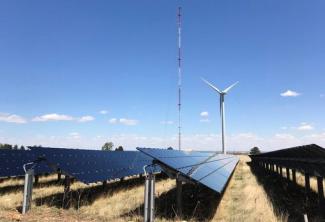The National Energy Technology Laboratory (NETL), the Pacific Northwest National Laboratory (PNNL), the Idaho National Laboratory (INL) and the National Renewable Energy Laboratory (NREL) comprise the Department of Energy’s (DOE) Net Zero Lab (NZL) pilot project ─ a $38 million initial investment announced today to advance new technologies and approaches for net-zero emissions and decarbonization that can be replicated in public and private facilities to benefit the entire nation.
With each of the four national laboratories exercising its own unique capabilities and specialties, NZL will serve as an example to large domestic and multinational businesses with large emissions footprints by demonstrating how to adopt technologies and procedures that can lead to effective decarbonization. DOE plans for the NZL effort to expand to all 17 national labs in FY23.
NETL Director Brian Anderson, Ph.D., joined DOE Secretary Jennifer Granholm and the directors of three other national laboratories to unveil the NZL pilot.
According to DOE, its 17 national laboratories are among the most complex, energy-intensive facilities in the nation and conduct operations across diverse climate zones, so if they can successfully attain carbon neutrality, then any facility in the nation can duplicate those efforts.
The NZL pilot intends to inspire large emitters to pursue lower emissions; highlight critical partnerships as a key component for decarbonization success; meet decarbonization commitments to reduce emissions by 50% by 2030, have 100% carbon free electricity by 2035, and reach a net-zero economy by 2050; and spur innovation in all DOE labs to achieve decarbonization goals and promote cost-efficient research and development.
Anderson explained that NETL, with research facilities in Pennsylvania, West Virginia and Oregon, is uniquely positioned to have an impact on the NZL effort, effectively expanding the NZL pilot effort to six locations. In addition to taking a wide range of decarbonization steps at each site, NETL research efforts will continue to focus on carbon management and carbon removal technologies.
“Regarding physical plants at each site, NETL will electrify its small vehicle fleet and continue to pursue site improvements for energy efficiency including improvements in its buildings that will result in lower power demands,” Anderson said.
He said that because NETL’s high-performance computing (HPC) capability has been an energy-intensive operation, the Lab will take steps to consolidate its HPC equipment and acquire better HPC processors to increase energy efficiency.
He added that NETL will aggressively pursue an array of additional innovations aimed at the net-zero goals including:
· Implementation of power purchase agreements that will incentivize carbon-free electricity (CFE) production and be a significant component of the Lab’s plan to achieve net-zero emissions by 2035, especially for its Pittsburgh campus. Partnerships with local utilities and other regional consumers will help accelerate the availability of CFE options within the region.
· Expansion of on-site power generation, including installation of an on-site solar array at its Albany, Oregon, campus and possible on-site power generation at its Morgantown, West Virginia, campus using biomass with carbon capture and storage to achieve net-negative emissions. The effort can provide combined heat and power to the campus, replacing the natural-gas-fired boilers for winter space heating. The integrated energy system may also include hydrogen production and/or integration with geothermal resources on-site.
· Demonstration of carbon dioxide removal (CDR) technology based on its $25 million Direct Air Capture (DAC) Test Center. The test center will identify promising technologies, which can be demonstrated at a larger scale onsite to provide a foundation for capturing hard to decarbonize residual emissions.
“NETL is proud to be one of the trailblazing laboratories included in the NZL effort,” Anderson said. “Each lab will work hard to serve as an example to others and play a role in fulfilling our nations decarbonization commitments through science and innovation.”




